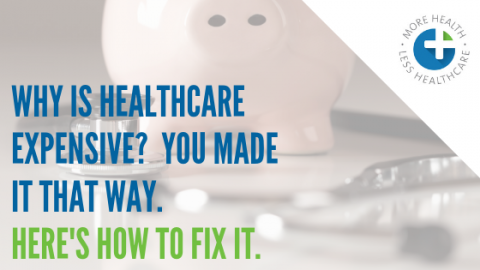
If we do one of those word associations where I say ‘healthcare,’ I would venture most of you would come up with the associative word, ‘expensive.’ You may be right or you may be wrong. Determining if something is expensive is rarely tied to how much money someone has but instead is tied to how urgent a need someone has.
When we deem something expensive, it’s often because we don’t have a value associated with it. As a result, most healthcare consumers just lump everything ‘healthcare’ as expensive and balk at spending…unless it’s an emergency. When something is an emergency, a HUGE value is tied to that procedure and most agree to whatever it will cost.
And that’s why healthcare is so ‘expensive.’ We, as the collective consumers, have conditioned the healthcare industry that we will spend whatever is necessary when the urgency is ultra high. All of a sudden our nature of being cheap with healthcare costs turns into the green light of printing money like you’re a member of Congress…because you think the little plastic card in your wallet that says, ‘health insurance’ will solve your issues.
The FIX
How do we fix this? We have to spend consciously on ourselves, out of pocket, outside of insurance, on a regular basis. 86% of healthcare costs are from chronic issues, not acute, emergency ones. That means 84% of those chronic illness claims can be lessened, prevented, and improved upon by conscious spending.
Why the 2% difference? Because someone is going to chime with the ‘exception’ to try and nullify the overwhelming majority to justify their lot in life. Guess what? Those people don’t get well. Stop trying to be the exception to everything. No one is that special.
Cheap vs. Conscious Spending
How do you know if you’re cheap or a conscious spender? Ramit Sethi outlines this great in his book.
Cost vs. Benefit
If you’re cheap, you only care about the cost. If you’re a conscious spender, you care about the value of something. As an example, you will see this vary greatly in the gym industry.
There are Globo gyms that are only $10/month and there are tiny, garage CrossFit gyms that typically start at $100+/month. If someone just wants a treadmill, they will say CrossFit is expensive. But from personal experience, there is so much more value in CrossFit than just getting you in shape. To me, that value is worth the price. The $10 is a waste to me. It will never get me the benefits of what I get with CrossFit.
Cost vs. Caring
Cheap people try to get the lowest price on EVERYTHING. Cheap people only go to what doctor is in-network with the cheapest co-pay. What cheap people don’t realize is that if they added up their monthly premiums for access to that cheap co-pay, with their deductible to even have their insurance pay out, they are paying far more than if they consciously spent on health services.
Conscious spenders try to get the lowest price on most things but spend on the items and services they really care about. Conscious spenders choose the provider that can lead and guide them to solve their issues and empower them to make sure it doesn’t happen again.
Conscious spenders choose functional medicine because they know the value that their program is going to create for them in terms of increased productivity at work (thus increasing their pay), better relationships with their spouse and kids (leaving a legacy), and more internal drive and reserves to pursue their purpose and passion (happiness).
Others vs. Self
Cheap people’s spending affects those around them. The cheap husband only wants his wife to go to the doctor that accepts the insurance, despite doing that over and over again, going from doctor to doctor with all the same result…more medication as she gets sicker and sicker. But when she is in the ER in crisis mode, he will open that wallet as far as it goes.
Conscious spenders frugality only affects them. I spend on things that will enhance and preserve my health expression. But I’m cheap with consumer products. I still sport the iPhone SE, that I bought in 2018. I drive a 2007 Nissan. I really like cars but anywhere on a daily basis is about a 7 minute drive and then the car sits in a parking lot. And I’m pretty sure I’ve worn the same Clark’s boots 250 days out of the year for the past 4 years. No one around me cares about those things. BUT if my health suffers because I’m cheap, that affects my wife, my kids, and my clients. If I don’t consciously spend on my wife and kid’s health, that affects me greatly.
Short Term vs. Long Term
Lastly, cheap people think short term. They get bent out of shape over the price of a single treatment at a single point in time. They forget or don’t care to understand that the intent of a treatment is to set the healing process in motion. The benefits aren’t really occurring at that point in time but realized down the road. This can be a PT session, counseling, a chiropractic adjustment, a session of HBOT, neuro-feedback, or even groceries.
Conscious spenders think long term. They know the healing process is a journey and there will be ups and downs during that journey. They are patient through the easy times and during times of resistance. This doesn’t mean conscious spenders don’t want results fast, they just realize that’s not entirely realistic.
Consciously Creating Culture
If we are going to successfully bring down the costs of healthcare, we have to create a culture of being conscious spenders. If we don’t consciously create that culture of consciously spending on health in our own family, it will unconsciously be absorbed from the cheap healthcare culture outside of our homes.


While you do make some salient points I think you are one of many who seem to overlook the impracticalities of functional ( and other ) medicine for those who really need it ie those who can least afford it for whatever reasons , if they are struggling to buy their kids new shoes for school and put food on the table and are working long hours in dead end jobs where are they going to get the money to fund the rebuilding of their health and have time for oxygen or chiropractic treatment plus all the rest of the package when their kids are one step away from starving ? beneficial as such treatments may be . I’ve never seen this question truly addressed anywhere , I wonder why .
So what’s your solution?
If we asked a bunch of 8 year old schoolkids what the solution was I’m sure we’d get an accurate if perhaps over simplified answer but it would be the right one , much the same as when I asked my young grandson what he thought about me getting boxes of painkillers for a mystery illness , he said ” but that’s only going to hide the problem grandad , it wont’ make it better ” so at 8 years old he had more sense than any of the doctors I’d seen but perhaps not the business acumen , having said that the docs must’ve been 8 once too you would think , I wonder what happened to them .